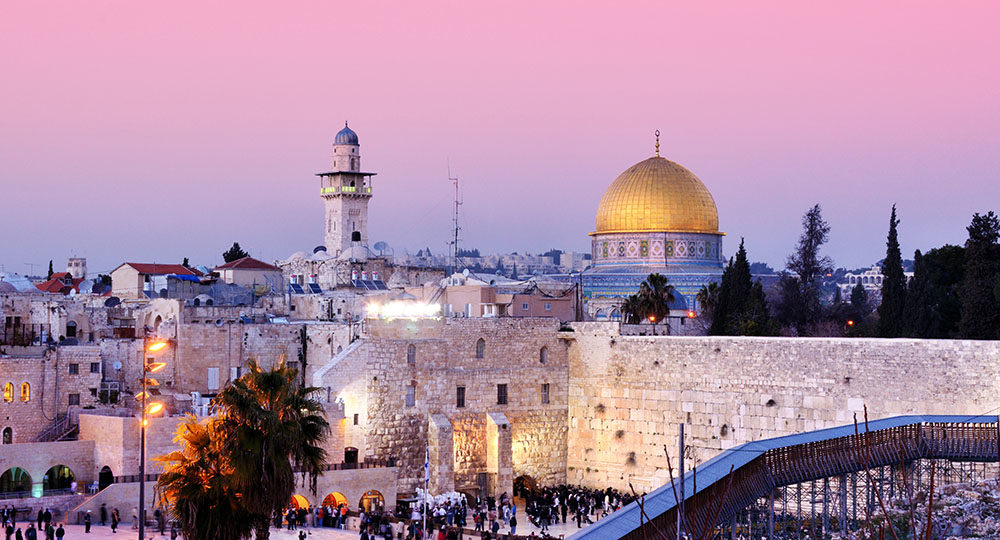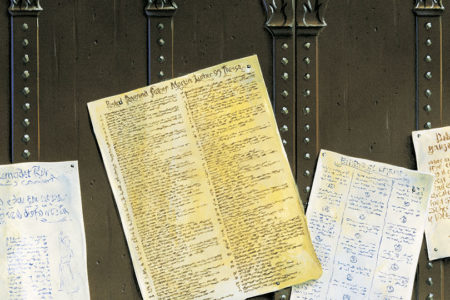Losing the Vision?
A few days before the recent Camp David Summit, four members of the Israeli Knesset were in Washington, D.C., to voice concern over how much Israel was being asked to concede to the Palestinians. Although they came from a variety of political parties, they nevertheless represented many Israelis who were alarmed over what negotiators might sacrifice at the summit. They also discussed the general frame of mind of many Israelis regarding the national commitment to Zionism.
Basically, Zionism is the belief that the Jewish people have a right to a secure homeland in the Middle East under the sanction of international law. Half of that vision was realized in principle when the United Nations voted the rebirth of the State of Israel in late 1947. Achieving security for the homeland, however, has been an ongoing struggle.
Although many of the early Zionists were not particularly religious, they based their right to return to the land on God’s promise to give the area as an everlasting possession to Abraham and his posterity through Isaac. In fact, the British-drawn borders for a Jewish homeland under the Balfour Declaration in 1917 were based on the biblical land grant. Prominent members of the British government at the time were Christians who accepted the divine mandate for a Jewish homeland. Consequently, the proposed state was to encompass the territory from the Little River of Egypt in the Sinai to the Euphrates in what is now Iraq.
The fervor of the Jewish people who returned to the land in the late 1800s and first half of the next century mirrored that of the ancient Israelites returning from Egypt under the leadership of Joshua. The Lord’s command was clear. They were to move in and possess their possession.
Moses, my servant, is dead; now therefore arise, go over this Jordan, thou and all this people, unto the land which I do give to them, even to the children of Israel. Every place that the sole of your foot shall tread upon, that have I given unto you, as I said unto Moses (Josh. 1:2–3).
A further word admonished them to be “strong and of good courage; for unto this people shalt thou divide for an inheritance the land which I swore unto their fathers to give them” (Josh. 1:6).
During the days of Joshua, they were indeed “strong and of good courage.” But by the time of the judges, their determination to carry out the divine commands had seriously eroded. Israel entered a post-Moses-and-Joshua era, and its loss of commitment cost the nation dearly.
Losing the Vision
We are often reminded that history does indeed repeat itself. Those of us who attended the meeting in our nation’s capital caught a glimpse of the past as expressed by one of the Knesset members. He said that what troubled him most was the fact that so many of his fellow Israelis have lost the Zionist vision. Even men in high office who are negotiating Israel’s future now reject any association between the land of Israel, God, and the Bible. They say the Jewish people have no biblical rights to the land, and therefore they feel free to negotiate away as much territory as needed to placate their “peace partners.” The hazards, they insist, are minimal because Israel maintains a strong military defense. Such thinking reflects the fact that we have entered what is being popularly termed “the post-Zionist” era.
But when the vision perishes, so does the will to make the vision a reality. This was the Israeli speaker’s second point. Perhaps he had in mind the famous statement made in 1897 by the father of Zionism, Theodor Herzl, when Herzl said at Basel, Switzerland, “If you will it, it is no dream.” Herzl, of course, referred to 2,000 years of dreams that the Jewish people would one day return to their ancient homeland. He and his Zionist contemporaries realized full well that from a human perspective, only an immense determination of will accompanied by blood and tears would make the dream come true.
The question being raised in many quarters at the moment is, “Why is Israel willing to sacrifice so much to people they know are committed to their eventual demise?” A number of American senators and congressmen posed that question to the visitors from the Knesset. Military experts are asking the same thing. Why, for example, would Israeli leaders be willing to allow Syrians to reoccupy the bunkers on the Golan Heights from which they harassed and attacked Israel repeatedly for decades? The answer usually accompanies a weary shrug of resignation. “Our people are tired of war. We just want peace. We know that we will pay a high price, but we’re hoping for the best.”
Certainly, the people of Israel are tired of terrorism and war. But will the anticipated “high price” prove too much to pay? Terrorist groups and radical Islamic adversaries have made a promise they intend to keep. Despite the commitment of others to establish peace between Israel and the Palestinians, these foes will continue to fight to destroy Israel.
Islam Has a Vision
To anyone who is paying attention, it is obvious that in the world of Islam, vision and will still go hand in hand. Travel anywhere in the Islamic world, moderate or radical, and ask if the nation of Israel has a right to exist. Almost universally, the answer will be an emphatic no. The issue goes beyond whether one is an Arab or not. Islam categorically rejects the very existence of the Jewish state. Not just in the Middle East but around the world, Jihad (holy war) through terrorist acts and military means is the weapon of choice against Jews and Christians, all of whom are considered infidels. But cleverly disguised word games with convoluted semantics are used as deceptive tactics.
When asked to account for his repeated calls in Arabic for Jihad against Israel and Jerusalem, Palestinian Authority Chairman Yasser Arafat contended that when he used the term in the company of fellow Arabs, he was referring to the war of words, ideas, and peaceful means of demilitarized aggression. Thus the Islamic vision and will remained in tact. At issue were the methods to be employed to make the vision a global fact of life. Perhaps this strategy is delivering a better payoff than armed aggression.
An Uneven Playing Field
Today the Western world of Christianity and Judaism is rapidly being invaded by both immigrant and homegrown Islamics. In England, America, France, Canada, and other countries, mosques are going up at an astonishing rate. Even in small communities where there are few or no Muslims, mosques are being constructed. Much of the funding comes from moderate Islamic states, such as Saudi Arabia, who send back (in the form of mosques and educational facilities) capital garnered from petroleum sales to gasoline-hungry Westerners. However, Saudi Arabia still has zero tolerance for Judaism or Christianity. Another such example is Afghanistan. No Christian churches exist in Afghanistan. Muslims bulldozed the one church that was there some time ago. Hosts of other examples are available, but the point is that Islam is not a pluralistic religion. Moreover, Christians and Jews who think we are somehow on the same religious wavelength as Muslims are predisposed to a rude awakening.
The Post-Christian Era
Perhaps it is ironic that the terms post-Zionist and post-Christian have come to the fore at relatively the same time. What they express raises serious questions. Do they tell us that Christians and Jews have lost their respective visions and, consequently, are losing the will to survive?
Even among large segments of the evangelical community, the idea is afoot that we must accommodate religions with vastly divergent doctrines and heretical or cultic theological systems as the wave of the future. Thus evangelism becomes offensive and defending one’s faith becomes contemptuous, according to the “religiously correct” norms of conduct. Such accommodation is, in reality, a new, more seductive form of ecumenicity than the brand liberal religionists foisted on a number of the major denominations more than a half-century ago. It is not congenial accommodation. It is visionless capitulation.
Israel faces an equally odious problem. In the streets and at the negotiating tables, people are crying out for what can best be described as national capitulation. Theirs is the voice of secular humanism promoting a kind of “brotherhood through surrender” that does not exist on this planet.
The Prophets Still Speak
At The Friends of Israel, we publish a book titled The Prophets Still Speak. To anyone who cares to listen, they do indeed. With regard to the subject at hand, they provide a particularly pertinent word.
“Where there is no vision, the people perish” (Prov. 29:18).
The word vision in this verse is not the word usually employed when referring to something seen. It is, rather, a vision that comes by way of revelation from God—His words, His will, His commands. Every time ancient Israel disregarded the vision, they lost their will and their wellbeing. Captivity, suffering, and chastisement often became daily burdens of life for a people who refused to believe it was better to obey than to sacrifice.
Such suffering was, in the main, physical and national. But for Christians, loss of vision and will covers much broader territory. People who perish in sin suffer the eternal consequences enunciated in the Scriptures. Therefore, choosing to empathize rather than evangelize becomes a fatal decision.
Moses had some choice words for the children of Israel in his final address to them before they entered the land.
I call heaven and earth to record this day against you, that I have set before you life and death, blessing and cursing; therefore, choose life, that both thou and thy seed may live (Dt. 30:19).
May the gravity of those words and the principles they articulate rekindle our passion for the vision He has committed to us and fuel the will to obey our Sovereign.







